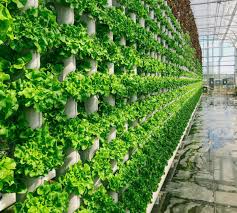Agriculture
The agriculture industry is a vital sector that provides food, fiber, and other essential products for human consumption and use. Some key aspects of the agriculture industry include:
Types of Agriculture
1. Crop Production: Growing crops
like grains, fruits, vegetables, and nuts.
2. Livestock Production: Raising
animals like cattle, pigs, chickens, and dairy
cows.
3. Organic Farming: Growing crops
and raising livestock without synthetic fertilizers,
pesticides, or genetically modified organisms
(GMOs).
4. Sustainable Agriculture:
Farming practices that prioritize environmental stewardship,
social responsibility, and economic viability.

Challenges in
Agriculture
1. Climate Change: Rising
temperatures, changing precipitation patterns, and increased
frequency of extreme weather events.
2. Soil Degradation: Soil
erosion, nutrient depletion, and salinization.
3. Water Scarcity: Limited access
to water for irrigation, drinking, and other agricultural
uses.
4. Pests and Diseases: Managing
pests and diseases that can damage crops and livestock.

Opportunities
1. Innovative Technologies: Developing and adopting
technologies like vertical farming, precision irrigation, and
farm robotics.
2. Sustainable Products: Creating products that promote
environmental sustainability and social responsibility.
3. Global Market Access: Expanding market access for
agricultural products, particularly for small-scale
farmers.
Opportunities in
Agriculture
1. Precision Agriculture: Using
technology like drones, satellite imaging, and precision
irrigation to optimize crop yields and reduce
waste.
2. Sustainable Agriculture
Practices: Implementing practices like regenerative
agriculture, agroforestry, and permaculture to promote
environmental sustainability.
3. Vertical Farming: Growing
crops in vertically stacked layers, often in indoor
environments, to increase yields and reduce land
use.
4. Agricultural Technology:
Developing and using technologies like autonomous farming
equipment, precision agriculture software, and data analytics
to improve agricultural productivity and efficiency.
The agriculture industry is evolving with technological advancements and sustainability focus. Some key areas include:
Technological
Advancements
1. Precision Farming: Using
drones, satellite imaging, and sensors to optimize crop
yields.
2. Automated Farming:
Implementing robotics and automation to streamline farming
processes.
3. Data-Driven Decision Making:
Analyzing data to inform farming decisions.

Sustainability Focus
1. Organic Farming: Growing crops
without synthetic fertilizers or pesticides.
2. Regenerative Agriculture:
Practices that enhance soil health and
biodiversity.
3. Sustainable Water Management:
Efficiently managing water resources.

Future Directions
1. Vertical Farming: Growing
crops in vertically stacked layers.
2. Genetic Engineering:
Developing crops with improved traits.
3. Farm-to-Table: Directly
connecting farmers with consumers.

Some key areas in agriculture include:
1. Crop management: Techniques
for optimizing crop growth and yield.
2. Livestock management: Best
practices for raising healthy animals.
3. Sustainable practices: Methods
for reducing environmental impact.
4. Technology integration: Using
tools like drones, precision farming, and data
analytics.
Some exciting innovations in agriculture include:
Precision
Agriculture
1. Drones: Monitoring crop
health, detecting pests, and optimizing
irrigation.
2. Satellite Imaging: Analyzing
crop growth, soil moisture, and weather patterns.
3. Sensors: Tracking temperature,
humidity, and soil conditions.

Sustainable
Practices
1. Vertical Farming: Growing
crops in vertically stacked layers, reducing land
use.
2. Regenerative Agriculture:
Practices that enhance soil health, biodiversity, and ecosystem
services.
3. Organic Farming: Avoiding
synthetic fertilizers, pesticides, and GMOs.

Technology
Integration
1. Farm Management Software:
Streamlining farm operations, tracking yields, and analyzing
data.
2. Artificial Intelligence:
Predicting crop yields, detecting diseases, and optimizing
farming practices.
3. Automation: Implementing
robotics and autonomous vehicles to reduce labor costs.
Future of
Agriculture
1. Gene Editing: Developing crops
with improved traits, such as disease resistance.
2. Urban Agriculture: Growing
food in urban areas, reducing transportation
costs.
3. Climate-Resilient Agriculture:
Developing practices and crops that can withstand climate
change.
